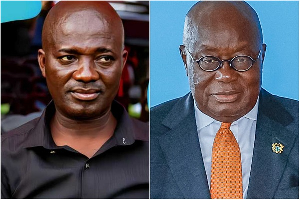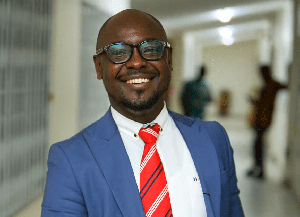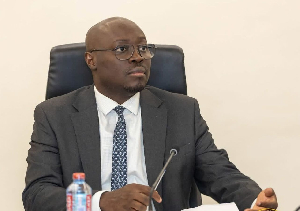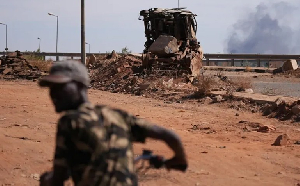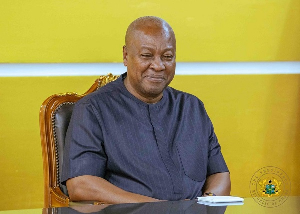By Kwesi Tamakloe
Let us get a fundamental point out of the way. Hon. Ken Agyapong MP’s outburst on radio on Friday 13 April 2012 that ended him up in BNI cells was stupid, crass, inflammatory and wholly unjustifiable, especially those that had ethnic flavour. The argument that he was provoked by the events at Odododiodoo into making those comments is simply infantile. He is not the only one who felt aggrieved by those events, yet he chose to express himself the way he did and is wholly responsible for his comments.
That said, the state’s handling of the matter, both as a matter of law and of politics, was abysmal and smacked of cheap amateurism and kindergarten gymnastics. First, somewhere in the middle of the afternoon of Monday 16th April, after all indications by the police (including visiting the home of would-be surety K.T Hammond MP to ascertain ownership issues) had been that Ken would be released on bail following his attendance at the CID headquarters earlier in the day by invitation, news filtered out that the police had suddenly, and without any explanation, changed their minds and were going to detain him further. Immediately, suspicions flared up that the decision to no longer grant bail was due to an ‘order from above’, a familiar concept in African public life.
Now to the charges of treason felony and genocide. One does not have to be a lawyer to understand that mere statements cannot by any stretch of the imagination be said to constitute attempts at committing a crime. They don’t even cross the threshold of planning such crimes. It was clear that these charges had no chance in hell on sticking and that Ken would walk, regardless of his despicable comments. A first year law school student would have advised freely that the public order offence of incitement to violence would be more appropriate and more likely to secure a conviction. The state clearly goofed as a matter of law.
The madness of laying such grave charges for what Ken said reasonably inclined people to believe that there was a political motive for doing what the state was doing and that it went beyond mere incompetence. Given that Ken almost single-handedly revealed the Woyome scandal which has cost the government heavy political capital, it appeared to many that far from legal incompetence, this was a golden opportunity for the government to teach Ken a lesson. The public order offence of incitement to violence (the most sensible charge in Ken’s case) is a misdemeanor, which makes it a bailable offence. However, the offences he was charged with are normally not bailable. Thus, the reasoning goes, laying such a charge would ensure that beyond the 48 hour-limit prescribed by law, Ken would be remanded by a judge, and then the prosecution would be able to drag its feet possibly for months whilst he cooled off in the slammer.
The apparent ineptitude resurfaced on Wednesday 18 April 2012 when the 48-hour limit for holding suspects was about to expire approached and state failed to either inform the defence of the venue of the court hearings or furnish them with a copy of the charge sheet, a situation his counsel Samuel Atta Akyea called ‘ambush litigation’. As at noon on that day, no one knew where Ken was. But again, many speculate that this was deliberate because of Ken’s political profile as a loud opponent of the government’, a claim which cannot be entirely dismissed out of hand.
Then the state, instead of heading to the high court for these grave charges to be dealt with, headed instead for the magistrates court in the afternoon to secure remand, whereupon the magistrate, Patricia Quansah, did a Pontius Pilate and washed her hands off the case, telling them to make a beeline for the high court instead. By the time they got to the high court, the court had closed for the day. Ken was clearly going to spend another night in BNI cells, taking him beyond 48 hours since his arrest. Crass incompetence again? Or deliberate legal gymnastics with a flavouring of political mischief to bleed out as much time as possible for him to be in custody? You be the judge.
Next day, Thursday 19 April, he was duly presented to the high court, and his lawyers filed a habeas corpus application before the court. The court granted him bail, for a variety of reasons, principally because the prima facie evidence provided by the prosecution was substantially weak and case law precedent allowed bail to be granted in those circumstances, notwithstanding the supposed ‘non-bailable’ status of the charge (see Justice Korsah in Seidu and Others v The Republic [1978] GLR 65 and Justice Kpegah in The Republic v Crentsil and Another [1987-88] 2 GLR 712). His health and the fact that he was an MP and a businessman were also taken into account by the court.
Then something interesting happened. Whilst the bail process by way of paperwork was in progress following the grant of bail and he remained in the custody of the state, the state filed fresh charges in another court. This time it was terrorism and the ubiquitous ‘fear and panic’ charges. Terrorism? Laughable, when you look at the law carefully. Again the defence had to make a bail application following this as bail had only been granted in respect of the earlier treason and genocide charges and there was a risk he could be whisked back to cells on the back of the new charges.
It is hard at this point to maintain that the state prosecutors were simply incompetent, bumbling at every stage along the way. Many of the state’s prosecutors are quite experienced and are not prone to fundamental legal errors such as those stated above. There are simply too many coincidences. An unseen political hand clearly is a more plausible explanation. It is obvious that someone, or some persons, wanted Ken to be ‘taught a lesson’, hence the comedy trail. And it is obvious that it was the government, for whom Ken had caused so many headaches, and which has the reigns of power and political patronage, would be the only culprit. There is plenty of motive and abundance of opportunity. Hardly rocket science.
But in their emotional hissy fit to show Ken where power lies when he ‘brought himself’ by his stupid utterances, the government, via the Attorney-General’s Department and the police, has unwittingly and perhaps foolishly turned Ken into an undeserving hero and martyr and suffered a serious backlash in the process, spilling on to the international scene. On either or both fronts- whether legal ineptitude or political crassness tainted with petty vindictiveness-the government lies badly wounded and exposed.
So what are the implications and what is the way forward? Interestingly, this situation may work out to the NPP’s advantage. By distancing itself from the ‘sin’ and embracing the ‘sinner’, the party seems to have deftly managed to walk a tightrope. Effectively the bar has been set for inflammatory language in public discourse by putting the government on the back foot. If any NDC official or appointee shoots his mouth too wide and uses extreme language, the authorities would be forced to act ‘ a la Ken’ or face a severe public backlash against cries of selective justice, from which the NPP will milk credible sympathy and political capital. And the NDC would effectively be expected to officially distance itself from the said comments, and if it fails or refuses to do so, it would lose hemorrhage credibility. It would be instructive to see how all this plays out.
As regards the charges against Ken, many agree that the charges of genocide, treason and terrorism are ludicrous, and that the s.208 charge (the fear and alarm offence) has little chance of success, primarily because the state must show that false information/statements have been put out by Ken, in the knowledge that it was false. The state would be better off dropping the mad charges, leaving the public order offences intact, and for which it is likely to secure conviction. In fact, it is the view among many that this is the state’s game plan, and that having been able to detain Ken for at least three days, it no longer needs these offences, the vehicle by which the three days of detention was secured in the first place.
Of course, the government may pat itself on the back for the fact that it has effectively silenced the embattled MP, who had to sign a bond of good behavior as part of his release conditions and will carefully have to watch what he says publicly. His counsel, Hon Atta Akyea MP’s statement that Ken will have to ensure that whatever he says in public is ‘seasoned with salt’ speaks volumes. Whether the silencing of Ken as a vociferous critic of the government is a worthy trade-off for the battering the government’s image following its handling of the matter is a separate matter that remains to be seen.
Ken is no hero. Let us not for once imagine he is. But let not the state feed into that perception held by his supporters by glaringly harassing him for political purposes. All that the apparent victimization does is inflame passions, thereby pushing up the political temperature up unnecessarily.
Opinions of Sunday, 22 April 2012
Columnist: Tamakloe, Kwesi
The Republic v Ken Agyapong: A (Deliberate) Comedy of Errors?
Entertainment



